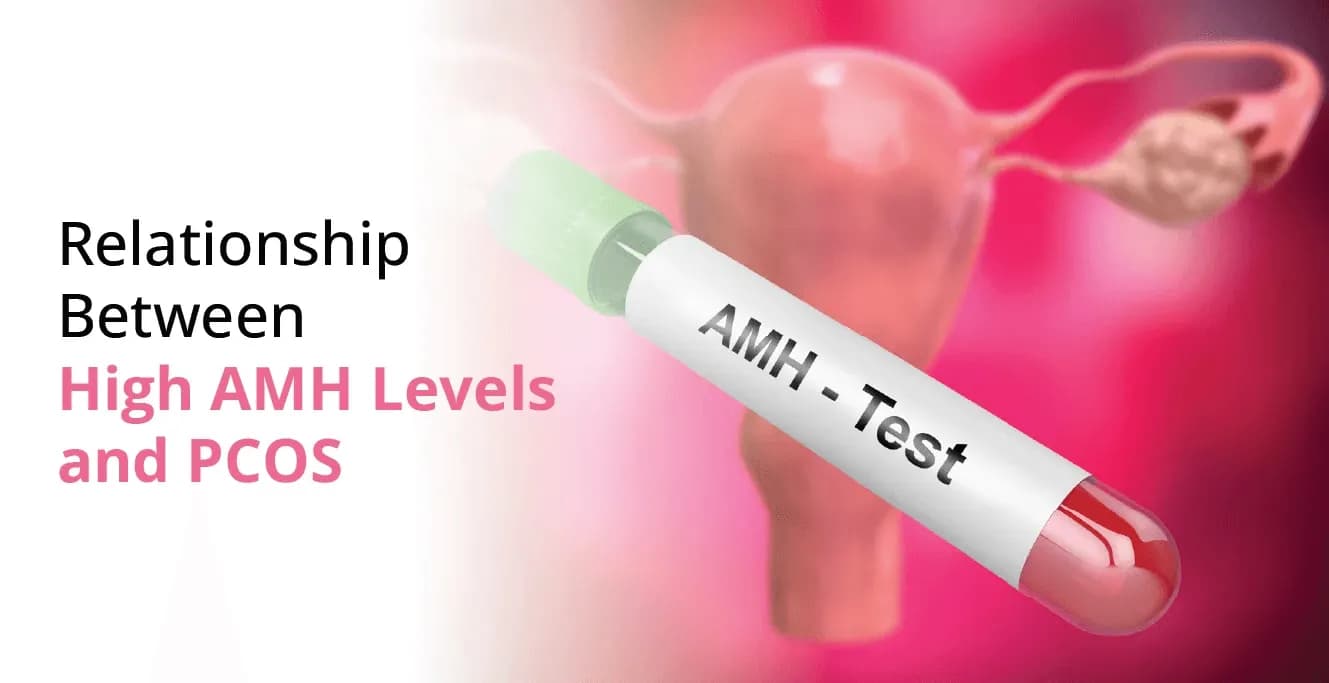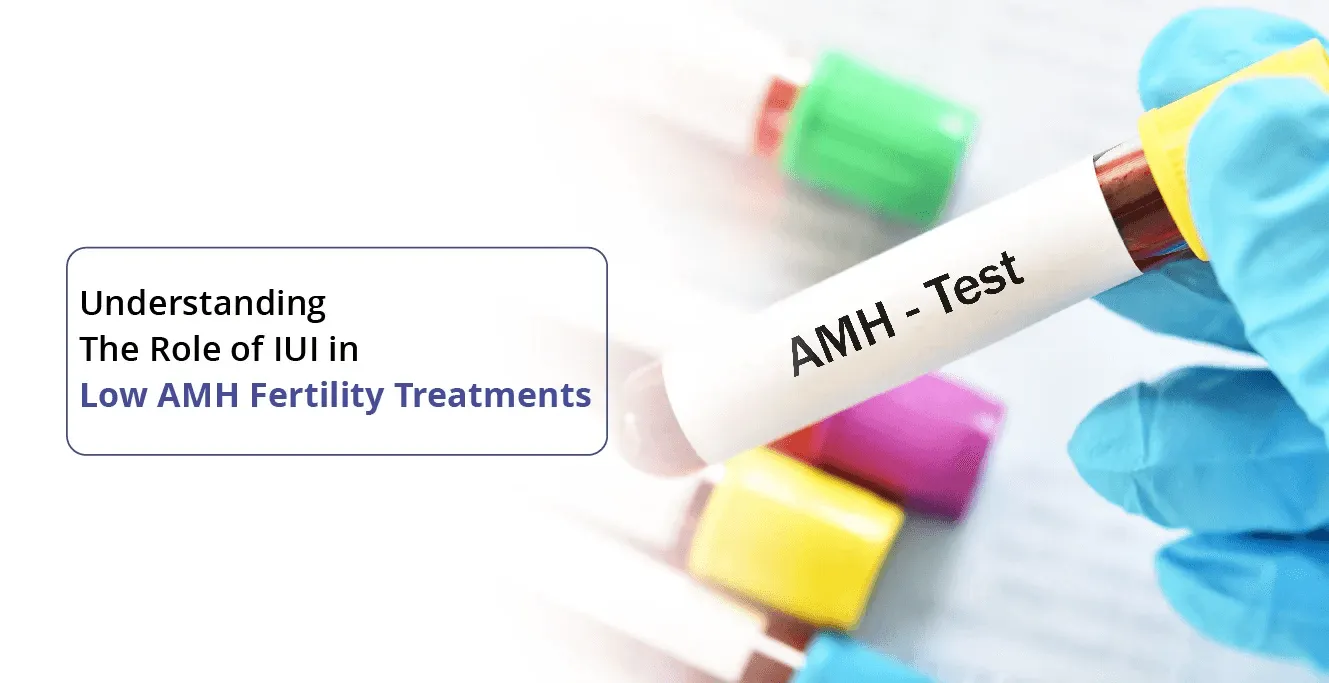Table of Contents
- What is AMH?
- Understanding Fertility Through AMH Levels
- How are AMH Levels Measured?
- What are Normal AMH Levels?
- High AMH Levels: What Do They Mean?
- How AMH Helps in Understanding PCOS and Fertility?
- Understanding the Effects of High AMH Levels
- Diagnosing PCOS with AMH
- Treatment for High AMH Levels
- The Bottom Line
If you’ve been told that your AMH levels are high, it’s natural to feel a little confused or even worried.
AMH is the hormone linked to the number of eggs in your ovaries. You might think higher levels of AMH are a good sign, but sometimes they may indicate Polycystic Ovary Syndrome (PCOS).
PCOS is a common hormonal condition that affects how your ovaries work. Hence, understanding the relationship between high AMH levels and PCOS becomes extremely critical. Let’s read about it in detail so that you can take the right steps toward balanced hormones, regular cycles, and improved fertility.
What is AMH?
AMH, or Anti-Müllerian Hormone, is a glycoprotein (carbohydrate + protein) hormone that is produced by the cells surrounding the eggs in your ovaries. This hormone plays a key role in your reproductive development, and high AMH levels are considered a sign of fertility. You may have many questions. Here are quick answers to some most asked ones.
Understanding Fertility Through AMH Levels
The secretion of AMH is considered one of the most important clinical markers of your ovarian reserve. It tells us about the number of eggs present in your ovaries. Your ovaries have follicles, which are small pouch-like cavities that contain the eggs. Each follicle can carry only one egg.
When the eggs are not mature, the granulosa cells in the ovaries secrete AMH. These are the same cells that produce other hormones like oestrogen. Since the follicles develop continuously as you go through your menstrual cycle, AMH levels are considered the most stable indicator of the number of eggs in your ovaries. The more eggs you have, the more fertile you are. This increases the chances of your getting pregnant.
How are AMH Levels Measured?
AMH (Anti-Müllerian Hormone) levels are measured through a simple blood test. Unlike other hormones, AMH can be tested on any day of your menstrual cycle, making it a convenient marker of ovarian reserve. The test helps estimate the number of eggs remaining in your ovaries, giving a clear picture of fertility potential. Blood is drawn, usually at a clinic or lab, and sent for analysis. Results are reported in nanograms per milliliter (ng/mL) or picomoles per liter (pmol/L). Higher AMH levels generally indicate a good egg reserve, while lower levels may suggest reduced ovarian reserve. Doctors often use this test alongside other fertility assessments to guide treatment decisions.
What are Normal AMH Levels?
The normal AMH levels can vary with age. Here is a small brief about the same:
- Women between 20-30 have high AMH levels, which indicates a good ovarian reserve.
- Women between 30-40 face a drop in AMH levels, which indicates a natural decline in egg supply.
- Women with PCOS have high AMH levels; however, their ovulation remains irregular, making it harden for women to conceive naturally.
High AMH levels in PCOS are a major sign of a hormonal imbalance that impacts ovulation, menstruation, and reproductive health in general. Women can enhance their fertility and hormonal well-being by learning how to control these levels.
High AMH Levels: What Do They Mean?
There are a lot of reasons and factors behind high AMH levels; however, what do they mean?
- They indicate a higher number of eggs in the ovaries.
- It can be a sign of PCOS in some women.
- It can also mean that women trying for fertility treatments have a stronger response.
- If the AMH levels are extremely high, it can mean the risk of Ovarian Hyperstimulation Syndrome (OHSS) during fertility treatments like IVF.
- Doctors consider high AMH along with other tests to personalize treatment plans for optimal outcomes.
How AMH Helps in Understanding PCOS and Fertility?
The tiny follicles in the ovaries create a hormone called AMH (Anti-Müllerian Hormone). It shows how many eggs a woman has and acts as a marker of ovarian reserve. Because their ovaries have more tiny follicles, women with PCOS (Polycystic Ovary Syndrome) frequently have AMH levels that are greater than normal. Because PCOS can alter ovulation and hormone balance, having a high AMH does not always indicate improved fertility, even though it does indicate a larger egg reserve.
Understanding the AMH levels with PCOS helps doctors:
- Assess ovarian reserve accurately
- Predict response to fertility treatments like IVF
- Customise plans and treatment protocols that help reduce complications and risks such as ovarian hyperstimulation.
Here’s a simple reference table for AMH levels and their interpretation:
| AMH Level (ng/mL) | Interpretation | Notes for PCOS Patients |
| <1.0 | Low | May indicate reduced ovarian reserve |
| 1.0 – 3.5 | Normal | Typical ovarian reserve |
| >3.5 | High | Common in PCOS, more follicles, careful treatment planning needed |
Understanding the Effects of High AMH Levels
High AMH levels often indicate that your ovaries contain a large number of small follicles. It is not always a positive sign. However, when AMH levels are too high, it can interfere with normal ovulation and overall reproductive balance.
Fertility Challenges:
The most frequent issues related to high AMH levels are related to fertility. The high AMH can prevent follicles from maturing and releasing eggs. This process is known as ovulation. Without regular ovulation, conception becomes difficult. The egg reserved doesn’t matter over here. This condition is commonly seen in women with PCOS. In such cases, the ovaries remain active, but they fail to release eggs efficiently. This leads to irregular periods and fertility challenges.
Long-term Health Concerns:
Hormonal abnormalities that impact more than simply fertility are also connected to elevated AMH levels in PCOS. A higher likelihood of insulin resistance, which over time can lead to type 2 diabetes, may be indicated by elevated AMH. Hormonal changes can also be a factor in cardiovascular problems, weight gain, and acne.
By keeping an eye on AMH levels, medical professionals can provide individualised treatments that support fertility and general health by balancing hormone levels, encouraging ovulation, and lowering long-term health concerns.
Diagnosing PCOS with AMH
- One of the most important markers of Polycystic Ovary Syndrome (PCOS) is AMH (Anti-Müllerian Hormone).
- The ovaries of women with PCOS typically contain more tiny, immature follicles.
- AMH levels in PCOS patients are frequently two to three times higher than normal because these follicles release AMH.
- The diagnosis of PCOS has historically depended on:
Menstrual periods that are irregular or nonexistent
Excess facial or body hair (hirsutism)
Oily skin or acne
Multiple ovarian cysts are shown on ultrasound
- AMH levels can now be measured with a straightforward blood test, providing a more practical and objective diagnostic approach.
- AMH should be evaluated in conjunction with symptoms and other hormone assays because it is insufficient to diagnose PCOS on its own.
- To improve fertility, control periods, or lower risks like diabetes and insulin resistance, doctors utilise AMH values to develop individualised treatment strategies.
- All things considered, AMH testing has improved the efficiency and accuracy of PCOS diagnosis, assisting women in receiving prompt care.
Treatment for High AMH Levels
Wondering how to reduce AMH levels in PCOS?
Well, there are methods to reduce your elevated AMH levels naturally after receiving a PCOS diagnosis. Before using these techniques, it is advisable to speak with your healthcare provider regarding high AMH treatment.
Exercise:
Exercise is excellent for improving ovarian blood circulation, lowering insulin resistance, and maintaining hormone balance. Together, these elements regulate your AMH levels and PCOS. If you’re wondering how to reduce AMH levels in PCOS naturally, then yoga, walking, cycling, and swimming are great options. You might give them a try.
Balanced diet:
This can improve your hormone balance and general health while reducing inflammation and insulin resistance. Substitute veggies, healthy fats, and proteins for processed and sugary foods.
Stressfree:
One of the primary reasons for hormonal imbalance and elevated AMH levels is stress. Stress can be reduced by practicing yoga and meditation, getting enough sleep, and engaging in activities you enjoy.
Stay hydrated:
This stops cysts from forming and enhances blood circulation. In addition to these lifestyle modifications, your doctor can recommend medication to control your menstrual periods and excessive AMH levels.
These simple ways can help you reduce AMH levels in PCOS patients and help them avoid unnecessary complications in the future.
The Bottom Line
Your chances of getting pregnant and your general reproductive health can be enhanced with the correct information and advice from qualified medical professionals. In this case, a blood test to gauge AMH levels is crucial. Hence, it is important that you understand the relation between AMH levels and PCOS.
The experts at Birla Fertility & IVF can better design the IVF treatment if you know your ovarian reserve, or high AMH levels may indicate that PCOS needs more research.
Do you have trouble conceiving, acne, excessive hair growth, or irregular periods? These might indicate an imbalance in AMH levels. Don’t put off seeing a doctor.
Our Fertility Specialists
Related Blogs
To know more
Birla Fertility & IVF aims at transforming the future of fertility globally, through outstanding clinical outcomes, research, innovation and compassionate care.
Had an IVF Failure?
Talk to our fertility experts

 Our Centers
Our Centers





















